Choosing a website platform

Due to popular demand, I have agreed to write a blog that provides an easy to understand comparison between the most widely used open source platforms: Wordpress, Joomla, Drupal and DotNetNuke.
A website platform is what makes a website dynamic. It enables people to add, edit, delete and move all kinds of content. The platform is usually very versatile so it can be used to configure websites, blogs, online shops, discussion forums etc. Investing time and money in developing your website on a specific platform is an important decision for any business and can be costly if the wrong choice is made.
I have therefore come up with a criteria that any size of business should consider when choosing a website platform. Each platform can be used for small to large scale enterprise level websites. (The data collected for this study was done on 16 May 2013.)
Value for money
While they are free to download and install, all platforms have specific hosting requirements and require time by your web development team to setup and configure. This section is broken down into:
- Hosting costs
- Installation speed
- Number of extensions
Hosting Costs
This determines what hosting commitments you need to make that will affect the website running costs.
- Wordpress; £15 per month
- Drupal: £15 per month
- Joomla: £15 per month
- DotNetNuke: £50 per month
(Based on our standards charges for a small website installation)
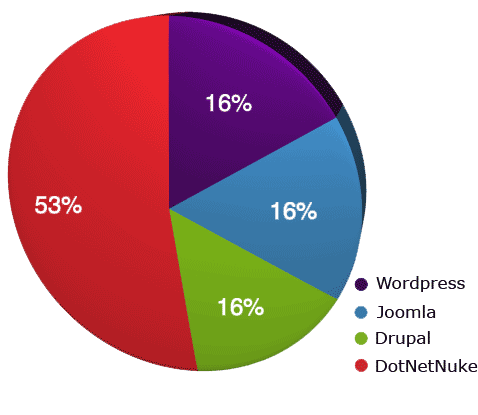
Installation Speed
This provides a benchmark into how efficient the platform is for your development team to build a website. e.g. the faster it is, the greater the cost saving.
- Wordpress: 0.5 hours
- Joomla: 1.5 hour
- Drupal: 1 hour
- DotNetNuke: 4 hours
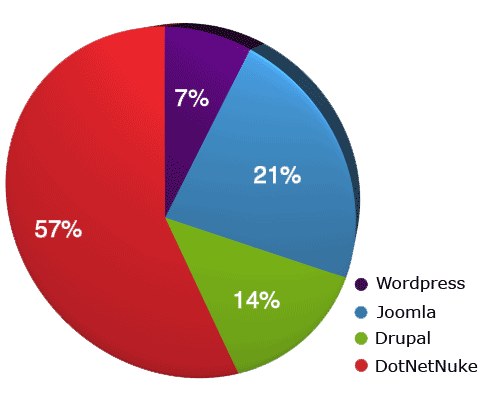
Number of Extensions
Extensions/Modules commonly provide plug and play functionality e.g. Newsletters. Each platform core installation is quite small so it can then be configured as you need it. The number of extensions (modules) provides an idea into how versatile the platform is and the chance of the website being able to do what you want it to. This also provides a guide into how active the development community is for the longevity of the website.
- Wordpress: 24,897
- Joomla: 6,519
- Drupal: 21,813
- DotNetNuke: 15,320 (approx.)
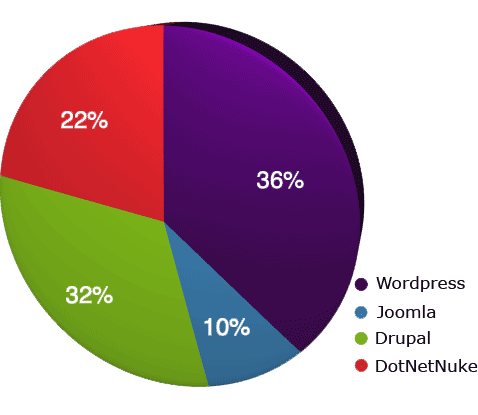
Popularity
This provides an idea of the number of websites that use each platform. The more people that use the platform, the longer the platform will be supported.
- Wordpress: 7,570,677
- Joomla: 1,871,262
- Drupal: 520,423
- DotNetNuke: 111,857
From: Built With
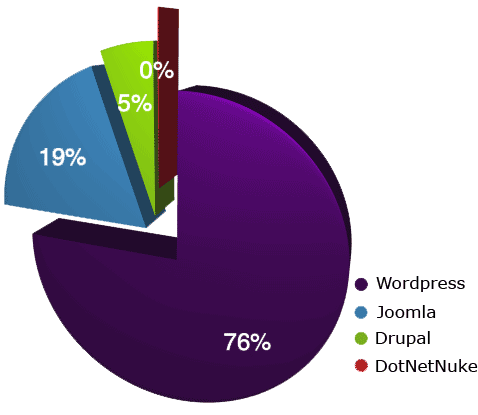
Security
How successful is the security model of the website? It is not possible to know if the platform is vulnerable or if the hosting setup is at fault or both. We have however run simple Google search for “my [platform name] website has been hacked“ and then taken the total number of search results and divided this by the number of installations of each platform. This provides us with a rough idea of the proportion of internet ‘noise’ talking about being hacked. (Please note that while these statistics are scary open source software should in theory be more secure than any proprietary system if setup correctly.)
- “my wordpress website has been hacked” = 75,900 / popularity = 0.010025
- “my joomla website has been hacked” = 135,000 / popularity = 0.072143
- “my drupal website has been hacked” = 1,510 / popularity = 0.002901
- “my dotnetnuke website has been hacked” = 1,030,000 / popularity = 9.208185
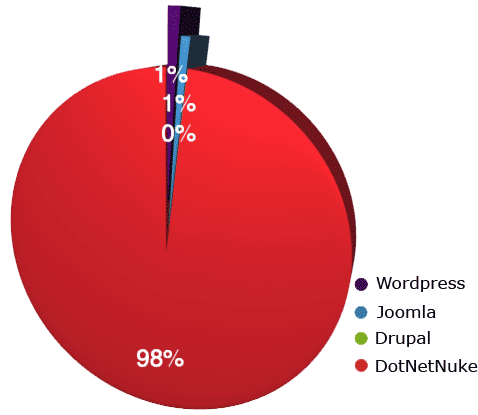
Active Communities
What makes open source platforms free of charge is the community behind the platform. The more the community contributes the more modules and the better the platform becomes. If the community is not active extensions/modules may not maintained as the core system improves. (The figures below are based on the total number of posts that have been posted in each support forum.)
- Wordpress: 3,447,200 (from Wordpress support)
- Joomla: 2,774,505 (from Joomla forum)
- Drupal: 1,140,650 (from Drupal forum)
- DotNetNuke: 405,669 (from DotNetNuke Resource Forum)
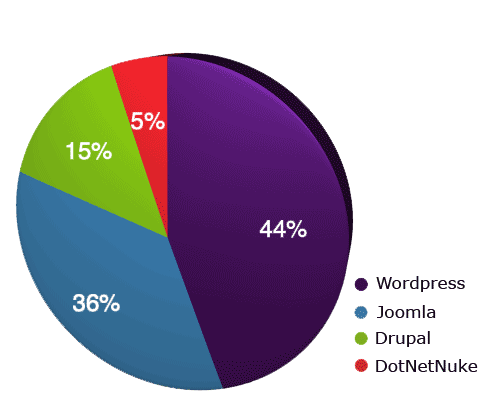
System Maturity
This determines how much time each platform has had to evolve and be refined.
- Wordpress: 10 years (27 May 2003)
- Joomla: 8 Years (22 Sep 2005)
- Drupal: 12 Years (15 Jan 2001)
- DotNetNuke: 5 Years (25 Nov 2008)
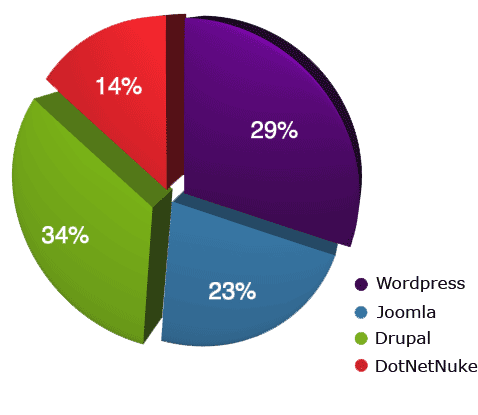
Summary
To then work out how each of them have scored, we have used negative percentages for the negative results.
| Platform | Hosting Costs | Installation Speed | No. Extensions | Security | Popularity | Maturity | Active | Total Score |
|---|---|---|---|---|---|---|---|---|
| WordPress | -16 | -7 | 36 | -1 | 76 | 29 | 44 | 161 |
| Joomla | -16 | -21 | 10 | -1 | 16 | 24 | 36 | 48 |
| Drupal | -16 | -14 | 32 | -0 | 5 | 35 | 15 | 57 |
| DotNetNuke | -53 | -57 | 22 | -98 | 0 | 12 | 5 | -169 |
WordPress provides the highest score.
Have we just concluded that we should all be using WordPress? Wordpress's popularity score is very impressive which I think is due to how easy it is to install and the demand for an easy to use blog platform. Due to Drupal's versatility, security, number of extensions, and the un-measurable points below, we are still comfortable recommending Drupal for any size of project. Drupal still provides our clients with the best user experience and value for money long-term.
Un-measurable
Accessibility responsibilities
It is a legal requirement in the UK for websites to comply with the W3C WAI accessibility guidelines to enable all websites to be accessible to all users, regardless of their physical disability and the devices they are using. This is often not taken seriously, so we have checked which platform is taking these considerations seriously.
Wordpress : There are many additional modules to help make Wordpress comply with the accessibility guidelines and some high quality themes that comply “out of the box’.Ref: http://codex.wordpress.org/Accessibility
Joomla: There is no evidence or support to make the Joomla platform accessible.
Drupal: Thre is a Drupal initiative committed to ensuring that all features of Drupal core conform with the World Wide Web Consortium (W3C) guidelines: WCAG 2.0 and ATAG 2.0. There is plenty of support however it is down to the web developer to set up the site correctly using the appropriate modules and build an accessible theme or use an existing one.
DotNetNuke : There is no sign of this being taken seriously and very little is written about accessibility for DotNetNuke.
General Limitations
What are the limitations to what can be done with the platform without re-writing it or building new modules.
Wordpress: If you need more than a blog Wordpress can be used to run your online shop and forums etc but it is starting to do more than the platform was built to do and it not easy to manage the administration area or generate custom lists of content.
Joomla: It requires steep learning curve before you get started and once it is up and running I have heard of many people who find it difficult to content mange their website and the admin interface is a bit “clunky’. I heard from one of my development teams that they were inundated with work converting Joomla sites to Drupal because of the increasing number of Joomla sites that had been hacked.
Drupal: Requires a steep learning curve to get started. It is not easy understanding which modules you need without the experience of using and trying them out. By default it generates a lot of page markup. Large websites need to be optimised using its effective caching strategy.
DotNetNuke I received an email from Tony Valenti the CEO of PowerDNN asking all DotNetNuke users to install immediate updates. It was very worrying that DotNetNuke being a .NET based platform can be used for some big websites. There are few positives I can say about it when comparing it with these other platforms. It is expensive to host because it relies on Windows which also makes it inefficient with server processing. It is insecure and requires a great deal of technical knowledge to build the simplest of websites.
Resources
- http://trends.builtwith.com/cms
- http://www.dotnetnuke.com/Community/Showcase-Sites.aspx
- http://en.wikipedia.org/wiki/Joomla
- http://en.wikipedia.org/wiki/WordPress
- http://en.wikipedia.org/wiki/Drupal
- http://engineindustries.com/blog/jason/which-open-source-cms-has-most-ac...
- http://en.wordpress.com/stats/
- http://drupal.org/project/usage/drupal
Add new comment